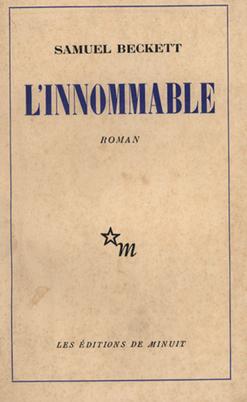 First edition (French) | |
| Author | Samuel Beckett |
|---|---|
| Original title | L'Innommable |
| Translator | Samuel Beckett |
| Language | French |
| Series | The Trilogy #3 |
| Publisher | Les Éditions de Minuit |
Publication date | 1953 |
| Publication place | France |
Published in English | 1958 |
| Preceded by | Malone Dies |
The Unnamable is a 1953 novel by Samuel Beckett. It was originally published in French as L'Innommable and later translated by the author into English. Grove Press published the English edition in 1958.